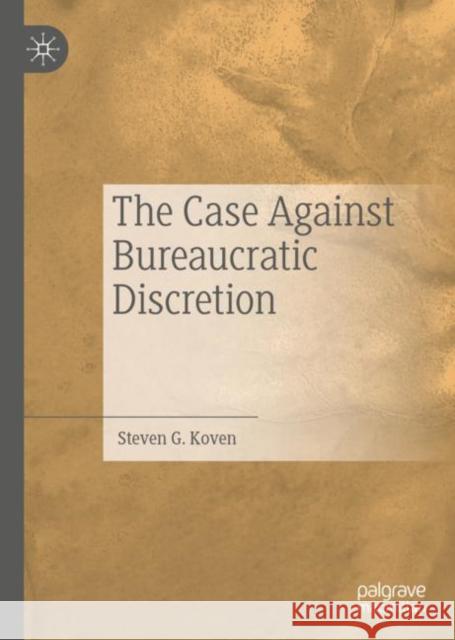The Case Against Bureaucratic Discretion » książka



The Case Against Bureaucratic Discretion
ISBN-13: 9783030057787 / Angielski / Twarda / 2019 / 238 str.
The Case Against Bureaucratic Discretion
ISBN-13: 9783030057787 / Angielski / Twarda / 2019 / 238 str.
(netto: 287,51 VAT: 5%)
Najniższa cena z 30 dni: 289,13
ok. 22 dni roboczych.
Darmowa dostawa!
Table of Contents
The Case Against Bureaucratic Discretion
Part I Theory
Chapter 1
Theoretical Grounding of Bureaucratic Ethics
A. Introduction
B. Growth of Administrative State in the U.S.
1. Pre-New Deal Growth
2. New Deal and Post-New Deal Growth3. Explanations for Growth of Government
C. General Ethos of Bureaucracies
1. Prescribed Legal Behavior of Bureaucrats
2. Sense of Responsibility of “Ideal” BureaucratD. Classical Theory of Administrators in Bureaucracies
1. Woodrow Wilson
2. Max Weber
3. Frederick Winslow Taylor4. Henri Fayol
5. Luther Gulick
6. Contributions of Classical Scholars to Understanding Discretion
E. Potential Abuses of Bureaucrats – Danger of Discretion1. Passive and Hidden Resistance
2. Active Resistance
3. Utility of Responsible Discretion
F. Plan of Book
Chapter 2
Theoretical Grounding of Democratic Accountability
A. Introduction
B. General Ethos of Democracy
1. Classical Greek Perspectives
a. Plato,b. Aristotle
2. Early European Perspectives –
a. Thomas Hobbes
b. John Lockec. Jean-Jacques Rousseau
d. Charles Montesquieu
C. Modern Democratic Theorists
1. A.D. Lindsay2. Dennis Thompson
3. Robert Dahl
4. Carole PatemanD. Alternative Perspectives of Democracy – Elite Democratic Theory
1. Walter Lippmann
2. Joseph Schumpeter
3. William Domhoff4. Robert Putnam
E. Conclusions
Chapter 3
Checks on Bureaucracy, Organizational Accountability and Organizational Culture
A. IntroductionB. Inner Checks on Bureaucrats
1. Technical Knowledge
2. Responsiveness to Popular OpinionC. Outer Check on Bureaucrats
1. President
2. Congress
3. Courts
4. Media
D. Organizational Accountability-Missions and Public Interest
1. Missions2. Public Interest
E. Organizational Cultures and Missions
1. Herbert Kaufman2. Charles Goodsell
3. James Q. Wilson
F. Controlling Bureaucracies1. Judith Gruber
2. Kenneth Meier and Lawrence O’Toole
G. Conclusions
Part II Application
Chapter 4
Discretion and Local Policy – Local Law Enforcement
A. Introduction
B. History of Police Abuse
1. Pre-1960s Abuse
2. Post-1960s Abuse
a. Civil Rights Protests
b. Police Provocation and Urban Riots
c. Police and Anti-War Demonstrators
d. Specific High Profile Cases of Police AbuseC. Contemporary Police Controversies
1. Sanford, Florida
2. Ferguson, Missouri3. Chicago
4. Cincinnati
D. Contemporary Police Controversies1. Baltimore
2. New York City
3. North Charleston, South CarolinaE. Possible Checks on Local Police Discretion
1. Organizational Reforms
2. Whistleblowing – Case of Frank Serpico
F. Conclusions
Chapter 5
Discretion and National Policy –National Law Enforcement and Veterans Affairs Abuses
A. Introduction
B. History of F.B.I
1. Genesis
2. Early Successes
C. Controversies - J. Edgar Hoover
1. Red Scare and Early Image of the FBI2. Later Abuses of the FBI
D. Controversies –Mark Felt and James Comey
1. Mark Felt2. James Comey
E. Jurisdictional Controversies
1. ICE2. Sanctuary Cities
F. Possible Checks on Agency Abuses - Whistleblowing
1. Sam Foote, the Doctor who Launched the VA Scandal2. Additional VA Whistleblower
G. Conclusions
Chapter 6
Discretion and Foreign Policy
A. Introduction
B. History of C.I.A. and N.S.A
1. Creation of the CIA
2. Early Successes and Evolution
3. Creation of the NSA
4. Early Successes and Evolution
C. Foreign Policy Controversies1. Vietnam Body Counts
2. Abu Ghraib Prisoner Interrogation
3. Iran-Contra Funding
4. Black Budget Operations
5. Secret Surveillance NSA/Snowden
D. Possible Checks on Foreign Policy
1. Media and Public Opinion
2. Whistleblowing at Abu Ghraib Prison – Sergeant Joseph Darby and Specialist Ron Ridenhour
E. Conclusions
Part III Conclusions
Chapter 7
Conclusions
A. Introduction
B. Accountability Problem of Bureaucrats as Policy Makers
C. Proposals to Foster Democratic Accountability
1. Stronger Whistleblower Protections2. Better Organizational Oversight
3. Responsible Media Attention
4. Legislative Oversight
D. Finding a Balance between Responsiveness and Arbitrary License
1. Peril to Democracy of Unresponsive Bureaucratic Systems
2. Control of Bureaucracy through Public Awareness (Communication), Agency Transparency (Truthfulness), and Responsiveness (Elections)
E. ConclusionsSteven G. Koven is Professor of Urban and Public Affairs at the University of Louisville, USA. He is author or co-author of ten books and many journal articles.
This book explores contemporary and historical examples of bureaucratic discretion to describe a continuum of resistance to authoritative directives by hierarchical superiors. Resistance ranges from blind obedience or complete nonresistance to street-level opposition; in between these extremes, however, are minimal compliance and resistance sanctioned by immediate superiors. Although politicians may pass legislation, the subject of bureaucratic implementation or lack thereof remains an area of vital concern. Grounded in administrative theory (beginning with Woodrow Wilson’s seminal discussion of the virtue of adopting a businesslike approach to American governing) and emphasizing the power of street-level bureaucrats, the aim of this book is to expand awareness of the potentially dangerous power of insulated bureaucrats.
1997-2026 DolnySlask.com Agencja Internetowa
KrainaKsiazek.PL - Księgarnia Internetowa









